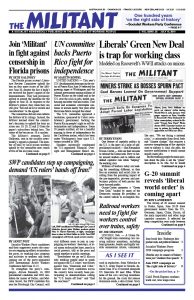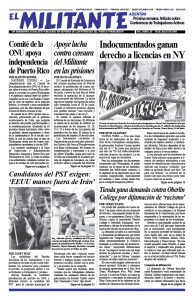July 11, 1994
BROOKLYN, New York — After less than two days on strike, 2,341 conductors, car repair workers, and track workers scored a victory in their contract fight with the Long Island Rail Road.
The four striking locals of the United Transportation Union forced the company to drop work rule changes sought by the railroad. The unionists also won an 8.5 percent wage increase over three years.
Union members expressed greater confidence in themselves after the settlement. Jerry Finn, a trainman, said, “I’m glad we stood up to the company. I’m glad that people got to see through the smokescreen that the union was holding people hostage through the strike, when it is in fact the company has been holding the workers hostage. When we go on strike it is the only time we learn that we’re so vital to the economy.”
July 18, 1969
The Kremlin-inspired Czech bureaucrats are nervous — and with good reason. For the power of the Czechoslovakian people to resist the current clampdown on democratization is beginning to demonstrate itself.
Following the recent government dissolution of the Czech student union, the metal workers had planned strikes in solidarity with the students. They were persuaded to call off the work stoppages at the last minute.
Nevertheless, an assembly of elected trade union delegates met and issued a declaration containing demands for an end to government encroachment on the independent role of the trade unions, termination of censorship of the union press, an end to increases in prices of necessities, opposition to “any suppression of our contacts with the union of the students,” and protests against bureaucratic practices by the national union leaders.
July 15, 1944
Alarmed by the prospect of post-war economic chaos which would strain the already weakened fabric of capitalist society to the breaking point, economic and financial experts of 45 Allied and Associated governments gathered in conference at Bretton Woods, N.H. on July 1 to discuss plans for currency stabilization and related problems.
Despite the efforts of the conferees to maintain an atmosphere of amiability, and to present the conference to the world as an example of genuine effort at “international cooperation,” the ugly reality of imperialist competition and rivalry breaks again and again through the brittle crust of polite speech-making.
What is actually going on is an intense if muted struggle between British and American capitalists for domination of the post-war world — with the British losing out to their powerful foes.

